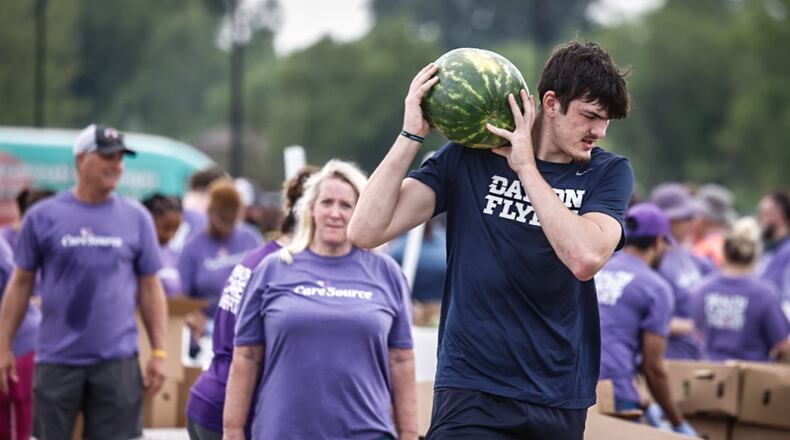“We’re going to continue to be here to support folks to make sure that they are fully invested and know where their local pantry is,” said Lee Lauren Truesdale, chief development officer for the Foodbank.
Last week, the Foodbank served about 400 households through its drive-thru on Wednesday morning. This is down significantly from the approximately 740 households served in two hours, five days a week, during the early weeks of the COVID-19 pandemic.
The Foodbank has been providing notices in multiple languages in order to let their regular customers know about the change, as well as to share with them how they can find food pantries within their own communities.
The Foodbank itself doesn’t typically provide direct services to individuals as its main service is operating as a central warehouse for local food pantries, soup kitchens and emergency shelters, Truesdale said.
“Our job is to acquire and distribute 16 million to 18 million pounds of food every year, and that food is distributed to 115 nonprofit food pantry partners at no cost,” Truesdale said. “We live and breathe to support these partner agencies. We’ve been around since 1976, we’re not going anywhere anytime soon.”
Credit: Marshall Gorby
Credit: Marshall Gorby
When the Foodbank does provide direct services like the drive-thru, its mobile farmers markets and the backpack program, those programs are meant to fill a gap in service.
The Foodbank built the drive-thru first to be a direct distribution model for its senior food box program.
“The senior food boxes are heavy. They weigh 38 to 40 pounds,” Truesdale said.
The Foodbank wanted a quick and easy way for seniors or their family members to drive through and pick up the box. They also planned to utilize the drive-thru for pop-up distributions when they get excess items or items that need to be distributed right away, such as bakery items, she said.
The drive-thru opened at the end of 2018, and they were just using it for the senior food box program until the 2019 Memorial Day tornadoes hit.
“Who knew the tornadoes were coming, and who knew that COVID was coming,” Truesdale said.
After the tornadoes, the drive-thru was open five days a week, both to accept product for a short period of time and then to distribute it, she said. They distributed water, canned goods and more to people who were in need because of the impact from the tornadoes.
The Foodbank started cutting down on its drive-thru days, going from five days a week to four, then three and then two days a week. Then COVID-19 hit in March 2020, and they served thousands of households served weekly during the early weeks of the pandemic.
Many of those individuals who came to them following the 2019 tornadoes or the pandemic were first-time emergency food seekers who did not know where else those services were available in the community.
Currently, the customers they see in the drive-thru are not first-time emergency seekers, Truesdale said.
The Foodbank will also be investing in more of its partners to help those pantries and kitchens serve more people in their communities.
“Our partner agency network has gotten stronger since COVID. We’ve added new agencies. Agencies are able to meet community needs better than ever before, and our agencies are experts at this work,” Truesdale said.
The drive-thru is not the best means for distributing food because it is not a choice food pantry model, she said. The food distributed through the drive-thru are bonus or excess products, which will be diverted to other agencies or to the Foodbank’s mobile farm markets.
“We believe in choice, and we believe in allowing residents who visit our network the ability to choose the items that they want to consume. The drive-thru just doesn’t provide for that, and it was never meant to be a standard pantry model anyways,” Truesdale said.
Finances were not behind the decision to end the drive-thru, she said. The Foodbank is continuing to expand, starting construction later this year on a community building that will include wraparound resources for its customers, such as SNAP and WIC application assistance, a staff probation office and exam rooms for low-level clinical work as necessary, Truesdale said.
For those who need assistance in locating a food pantry, visit thefoodbankdayton.org/locate-pantry/ or call 937-949-4096 on Mondays through Thursdays between 9 a.m. and 4 p.m.
About the Author


